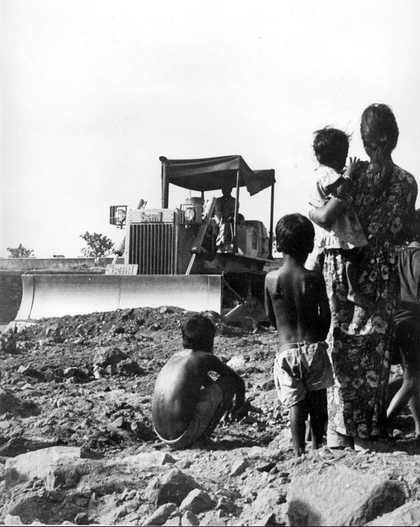The Children of Mandala
India 2009, video, 5 min, Hindi, English subtitles
In Mandala, Mumbai, slum children huddle in a makeshift school as rain falls into waiting metal buckets. Inside huts leaning against each other, tarpaulin draped over corrugated roofs and sheets draped over entrances, they deliver messages of invitation, solidarity and protest. Three girls and a boy ask the viewer to ‘Stay today O Stranger in our Mandala village’. This is Mandala Life School run by a movement for the homeless that fights a State policy intent on withholding education from the poor while destroying the only homes they have managed to build.
Hamara Shahar/Bombay: Our City
India 1985, 16 mm, 75 min, Hindi, English subtitles
Patwardhan’s acclaimed documentary, made on 16 mm, tells of Bombay’s millions of pavement dwellers. Throughout the early 80s there were brutal efforts to evict families who lived in illegal tenements and on pavements although they literally built the city and provided it with labour crucial to its economy. The film looks at the culture of Bombay’s elite, often contrasting what they say with the physical conditions in which they say it: the former Municipal Commissioner bemoans the lack of space in the city while his pet dog trots around his spacious garden; the Police Commissioner Julio Ribeiro, in a speech at the Advertising Club, talks about the poor as ‘low quality, low intelligence’ people. The pavement-dwellers work in the construction industry in the city’s expensive Nariman Point area on land reclaimed from the sea, while massing clouds on the horizon evoke the possibility of an unbalanced environment which may cause tidal waves to wash away their seaside huts. The film achieves epic dimensions in three remarkable sequences. Street urchins sell the Indian flag on a rainy Independence Day, keeping their precious commodities dry while the Gothic façade of the Victoria Terminus presides over a police march-past; in the thick of the monsoon, a child in one of the homeless families dies; a woman pavement dweller’s angry outburst at the filmmakers all highlight the issues involved in the making of this type of documentary.
– Ashish Rajadhyaksha and Paul Willemen, Encyclopaedia of Indian Cinema, New Revised Edition, New Delhi 1999, p.390.
Curated by The Otolith Collective. Followed by response and audience discussion with Anand Patwardhan, Kodwo Eshun and Anjalika Sagar.

